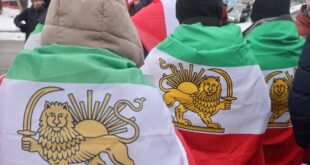Ever since Iran’s nuclear issue has been handed to the United Nations Security Council for punitive actions, crisis in the region has been flaring up at periods, each time the case is opened or closed for review.
Crisis in Lebanon, the hostage-taking of British sailors, and nowadays the explosions at the holy sites in Iraq and the wave of terror and war in Iraq, Palestine and Lebanon, are all in fact embedded messages from Tehran.
Last year on August 22, Keyhan, a state-run daily published in Tehran wrote “The Iranian dossier will not be resolved at the negotiating table unless when the other party comes to realize that the cost of engaging Iran is so high that the bitterness of compromise will be considered justifiable.â€Â The paper continues, “The West will only give in to the emergence of a nuclear Iran when it is left with no other choice.â€
“Iran’s regional power is so much that it has the ability to confront matters from a strong stance. Iran’s dossier will not be resolved at the negotiating table but it will be resolved in the streets of Beirut and Baghdad,†suggested Keyhan daily.
Of course what the daily is referring to as “Iran’s regional power†and “strong stance†refers mainly to its ability to fuel murder and crisis in Baghdad, Beirut, and Gaza Strip.
The strategy of “creating crisis in the region†and “negotiate in the West†is what the Iranian mullahs believe will lead them into stability and gaining hegemony in the region which would help them realize their longtime dream of an Islamic Empire. The negotiations will help Tehran buy time while crisis will keep West on its toes.
The above strategy, though devised cleverly, has its flaws. Â
The West will not accept mullahs’ hegemony in the region and as the leaders have clearly and repeatedly stated, they “will not accept a nuclear Iran.â€Â Consequently the cycle of “violence – negotiations†can not be a never-ending loop and sooner or later will have to come to a conclusion and when it does, it will be payback time for the mullahs.
The mullahs’ on the other hand, foreseeing a very dangerous turn ahead, are trying to portray their aggressive warmongering policy in the region as a sign of their strength. On the contrary, if there was any strength left in this regime, it would have used it to immediately make a U-turn and prevent the obvious upcoming head to head clash with the West. Let us not forget that there is still time for Iran to prevent another UN Security Council resolution. But a regime as fragile as the mullahs’ can not withstand such maneuvers and as Ahmadinejad has said repeatedly, “The Iranian nuclear program, is a train with no brakes and no reverse.â€
 Eurasia Press & News
Eurasia Press & News



